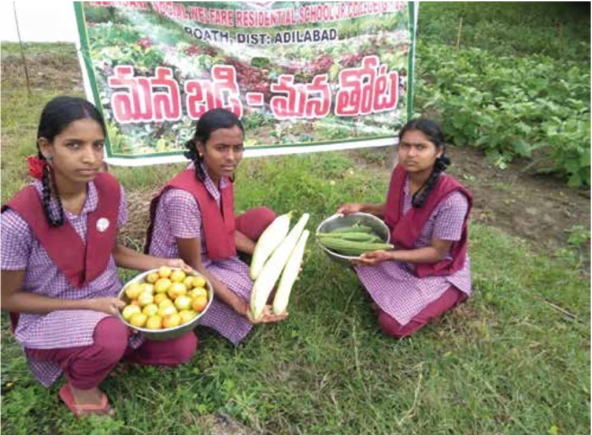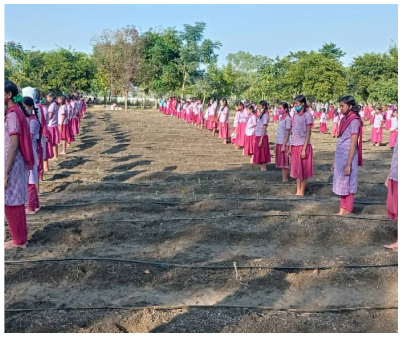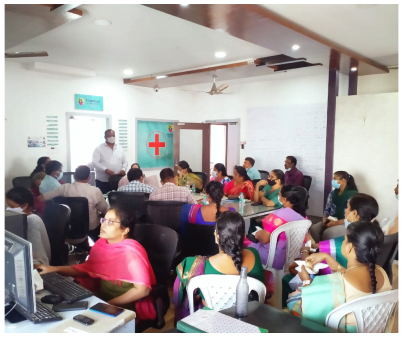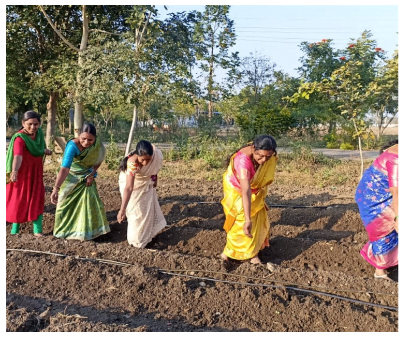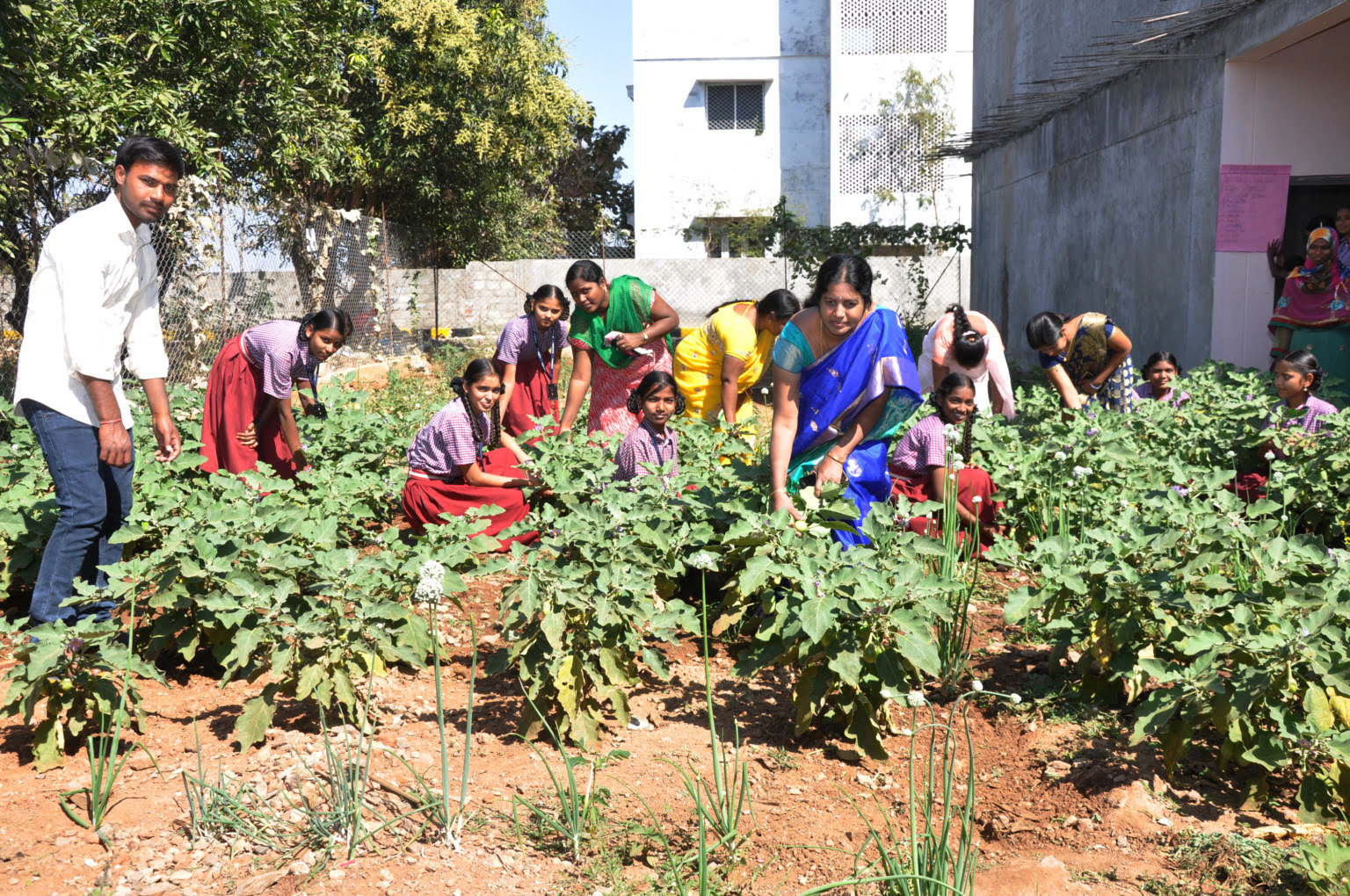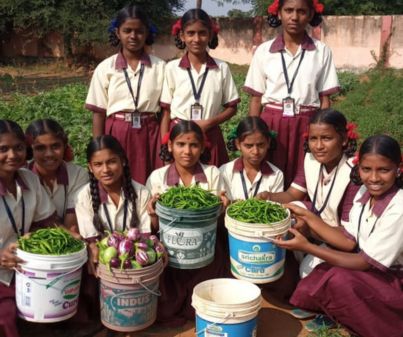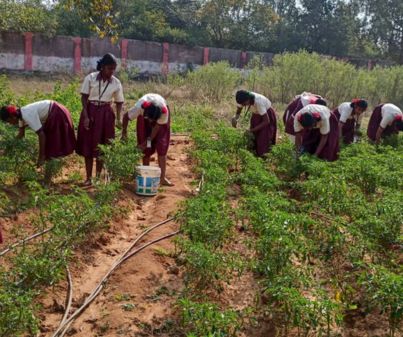EARTH SCHOOL – ABOUT CORNOCOPIA
The word ‘Cornucopia’ symbolizes ‘plenty’ – a container overflowing with flowers, fruit, and corn. SIF coined this name for the Earth School project very thoughtfully, as under it, SIF strives to nurture children’s life and overflow their minds with progressive thoughts.
Under Cornucopia Earth School Program we focus on:
- Developing Students’ ability to grow their own food in their own space.
- Help students acquire knowledge, practical skills on agriculture and horticulture and develop capabilities to grow their own food, to a certain extent, thereby aiding a chemical pesticide free, low cost and sustainable food habits.
- Helping students understand the importance of nutritious food and helping them get every essential nutrient from their self-grown organic produce in the school’s farms, thus overcoming malnutrition.
- Offering highly balanced and nutritious meals, thus enabling their physical, psychological, and emotional development.
- Reduction in the feeding cost of the schools leading to overall reduction in food budgets.
- Overall improvement in students’ attendance and higher enrollments.
- Understanding environmental conservation and reduction in use of harmful chemicals in diet.
- A paradigm-shift for students to develop a mindset for agri-preneur models rather than conservative farming
Under Earth School Project we aim at:
- Conversion of the available unused land in the institution into cultivable farmlands.
- Produce organic vegetables and fruits to meet the requirement of the institution.
- Empower the students (6-9 grades) interest in agriculture by acquiring knowledge, and practical skills and exploring opportunities in agriculture.
Vision
We envision a society where everyone is privileged and understand their full potential. With Cornucopia Earth School Project, we dream of promoting environmental stewardship among our future generations and helping them recognize the importance of environmental sustainability.
Mission
Cornucopia Earth School Project aims to provide an exceptional and holistic educational experience to students in agriculture, especially organic farming. We strive to empower students with knowledge as well as compassion towards Mother Earth and become compassionate and responsible global citizens. With this, we focus on livelihood and employment opportunities for socio-economically backward communities.
Significance
Under Cornucopia Earth School, we offer project-based learning to students. It has stimulated the little minds and made them aware of their environment and the importance of sustainable livelihood. This project is highly significant, helping students indulge in the process of learning and unlearning the basics of agriculture, horticulture, and organic farming.
While life in present day circumstances is marked with numerous technological advancements and inventions that are geared to provide convenience to the public, it has made us forget the survival skills that our elders and ancestors had ingrained in their way of life.
Researchers have shown that when children grow their food, they develop “food empathy”, which is a deeper connection with food, which leads to a healthier life. Such children have better diets, and understand nutrition better.
High-quality foods in schools correlate with better behaviour and higher levels of concentration. Furthermore, people who engage in growing their own food in their formative years, benefit from a calming activity that is highly kinaesthetic on a day-to-day basis.
Therefore, agriculture and horticulture is a great way for students to self-soothe, reflect, gain tranquillity and grow as thoughtful individuals. Our project aims to equip students with knowledge, skills and values in this field to have a better future for them.
Impact
The program is in its pilot stage and has covered 2826 students from over 5 institutions across the state of Telangana, from academic year 2020-21 onwards to till date (i.e., November 2022)
Future Possibilities
Cornucopia Earth School Project is shaping little minds for a brighter future. Under the project, we are inculcating their interest in agriculture and telling them about the infinite possibilities in the sector. We are helping students acquire knowledge and skills and showing them the path to becoming successful agri-prenuers.
Agriculture and allied activities account for about 15.7 % of India’s GDP and therefore there is a huge opportunity for students to pursue higher education in agriculture and also take up agriculture as a livelihood option as they grow up.
Value-added agricultural products have great markets too. Profitability is also high in the organic and value-added farm produce segment. Therefore, it is apt to say, that the Cornucopia project is not only addressing the needs of food sustainability, emotional and physical wellness of students in school; but it is paving way for livelihood orientation as an informed choice, through hands on experience of agriculture within the school campus.
Further, the following additions can be made into the Cornucopia program for increased impact:
- Placing honey bee boxes in the school farms, especially under the fruit trees will help in improved pollination and therefore higher yield of agriculture and horticulture produce.
- A partnership with Govt. of India’s Sector Skills Council (https://asci-india.com/), for assessment and certification of students engaged under the Cornucopia project. This may open up newer avenues for academic and vocational skill building of these students from the livelihood perspective.
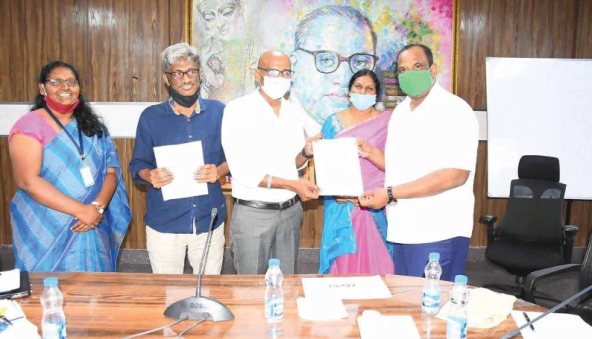
PROJECT BACKGROUND
The pilot project was undertaken by SIF and KVK Warangal is one of the TSWREIS institutions in Warangal. 3 months study by an Agri scientist was conducted including the teachers, students, and existing resources at the institution to understand the need and sustainability of the program. Earth School concept has evolved as part of this experiment to make the institutions self-sustainable and thus provide children of these institutes organic and nutritious food.
ROLE OF STAKEHOLDERS

SYNERGY INDIA FOUNDATION
Project Execution
- Provide technical support
- Planning and execution of the project
- Mobilizing the entrepreneurs
- Monitoring and Evaluation of the project
- Developing data management system – right from collecting the data of yield from the fields to being outsourced, and projecting the same in the dashboard for quick reviews
- Supports the Swaeroes entrepreneurs in co-coordinating with CSA for any queries.
- Research study on child health at the institution
- Going forward replicating the model in other institutions

CENTRE FOR SUSTAINABLE AGRICULTURE
Project Partner
- Capacity-building training for the Agripreneurs
- Plan and suggest types of crop cultivation that can match the requirements of the institution
- Provide Technology inputs and specialized Agri based skills
- holding at every level
- Channelise government grants, subsidies, technology, and schemes for this program
HOW DO WE PROPOSE TO DO IT
- Brainstorming for preparing the schools for the project
- Identify and selection of aspirant Agripreneurs
- Develop Curriculum for students and make it a part of their academic calendar
- Capacity building trainings for Agripreneurs, who will in turn train the students by
- giving practical exposure
- Planning of the crop produce in a way to meet the requirements of the institution
- Everyday monitoring of the farm activities
- Data management and reporting with technology interventions
PROJECT OUTCOMES
- Students to grow their own food in their own space.
- Students will acquire knowledge, practical skills and explore opportunities in the agriculture Understand their own food system
- Reduce the feeding cost of the schools and improve their health.
- Regular attendance and an increase in the school enrolment.
- It will also provide a highly balanced and nutritious meal from their own school’s farms, enabling their physical, psychological and emotional development and understanding the environmental conservation Reduce the use of harmful pesticides and plastic
- A paradigm shift from a conservative farmer to an Agripreneurs who will venture into a business model
